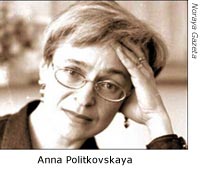New York, October 7, 2006—The Committee to Protect Journalists condemns today’s murder of Anna Politkovskaya, a Russian journalist renowned for her critical coverage of the Chechen conflict. Politkovskaya was found shot to death in the elevator of her apartment building in Moscow, The Associated Press reported.
The Interfax news agency, citing police, said Politkovskaya had been shot and that a pistol and four bullets were found in the elevator. Prosecutors planned to open a murder investigation, a spokeswoman for the Moscow prosecutor’s office told AP.
Politkovskaya, special correspondent for the independent Moscow newspaper Novaya Gazeta, was well known for her investigative reports on human rights abuses by the Russian military in Chechnya. In seven years covering the second Chechen war, Politkovskaya’s reporting repeatedly drew the wrath of Russian authorities. She was threatened, jailed, forced into exile, and poisoned during her career, CPJ research shows.
Igor Korolkov, a colleague, told the Regnum news Web site that Politkovskaya had been reporting on alleged torture in Chechnya for a coming story.
“Anna Politkovskaya was uncompromising in her pursuit of the human story behind the ongoing war in Chechnya. In risking everything to tell this story, she became one the leading press freedom figures of our generation,” CPJ Executive Director Joel Simon said. “Her death is a great loss to journalism, to her country, and to the service of truth. Russia is one of the most murderous places in the world for journalists, and it has a long history of impunity in these killings. This is the time for Russian authorities to reverse this years-long assault on independent journalism by bringing Anna Politkovskaya’s killers to justice.”
CPJ had named Politkovskaya one of the world’s top press freedom figures of the past 25 years in the next edition of its magazine, due out next month. In an interview for that profile, Politkovskaya noted the government’s obstruction and harassment of journalists trying to cover the Chechen conflict and pointed to the deadly 2004 hostage crisis in the North Ossetian town of Beslan. “There is so much more to write about Beslan,” she told CPJ, “but it gets more and more difficult when all the journalists who write are forced to leave.”
Politkovskaya was poisoned on her way to cover Beslan crisis. After drinking tea on a flight to the region, she became seriously ill and was hospitalized—but the toxin was never identified because the medical staff was instructed to destroy her blood tests.
Russia is the third deadliest country in the world for journalists over the past 15 years, behind only the conflict-ridden countries of Iraq and Algeria. A new CPJ report found that 42 journalists had been killed in Russia since 1992, many of them slain in contract-style executions and the vast majority unsolved by Russian authorities. The report is available at http://www.cpj.org/Briefings/2006/deadly_news/deadly_news.html.
The contract-style slaying of American journalist Paul Klebnikov is among the many cases that are unsolved. Two men were tried this year and acquitted. Klebnikov, editor of Forbes Russia, was gunned down on a Moscow street in July 2004.
Politkovskaya has been threatened and attacked numerous times in retaliation for her work. In February 2001, CPJ research shows, security agents detained her in the Vedeno district in Chechnya, accusing her of entering Chechnya without accreditation. She was kept in a pit for three days without food or water, while a military officer threatened to shoot her. Seven months later, she received death threats from a military officer accused of crimes against civilians. She was forced to flee to Vienna after the officer sent an e-mail to Novaya Gazeta promising that he would seek revenge.
When Politkovskaya covertly visited Chechnya in 2002 to investigate new allegations of human rights abuses, CPJ research shows, security officers arrested her, kept her overnight at a military base, and threatened her. In October of that year, Politkovskaya served as a mediator between armed Chechen fighters and Russian forces during a hostage standoff in a central Moscow theater. Two days into the crisis, with the Kremlin restricting media coverage, Russian forces gassed the theater and 129 hostages died. Politkovskaya delivered some of the most compelling accounts of the tragedy.
Read CPJ’s 2005 report on government obstruction of journalists covering Chechnya.
